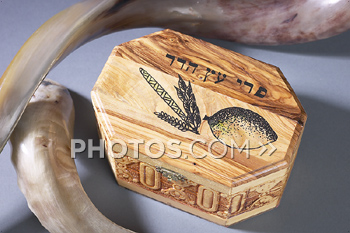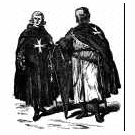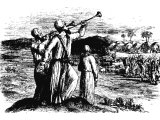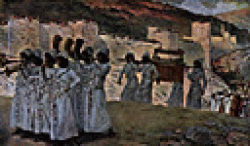|
BACKGROUND
THE FEASTS
EASTON
FEAST; FESTIVALS - RELIGIOUS; ATONEMENT; ATONEMENT, DAY OF; AZAZEL; PASSOVER; PENTECOST; TABERNACLES, FEAST OF:
NEW BIBLE DICTIONARY
PASSOVER; PENTECOST, FEAST OF; TABERNACLES, FEAST OF:
The
full background to this teaching is available online at this link
THE FEASTS - BIBLE DICTIONARIES
|
Online links to scriptures (New International Version [NIV] unless otherwise stated) are shown in blue
| FEAST OF TRUMPETS |
|
 23 The LORD said to Moses, 24 “Say to the Israelites: ‘On the first day of the seventh month you are to have a day of rest, a sacred assembly commemorated with trumpet blasts. 25 Do no regular work, but present an offering made to the LORD by fire.’†(Leviticus 23:23-5) 23 The LORD said to Moses, 24 “Say to the Israelites: ‘On the first day of the seventh month you are to have a day of rest, a sacred assembly commemorated with trumpet blasts. 25 Do no regular work, but present an offering made to the LORD by fire.’†(Leviticus 23:23-5)
|
| THE CALL TO ACTION!
|
|
 As the first of the three feasts that go to make up the autumn Feast of Tabernacles, the Feast of Trumpets was, and remains, a call to action for God’s people. This feast came after a period of three months of relative spiritual inactivity, marking as it did the conclusion of the long, hot, dry summer period, a major feature of the climate of Israel. As the first of the three feasts that go to make up the autumn Feast of Tabernacles, the Feast of Trumpets was, and remains, a call to action for God’s people. This feast came after a period of three months of relative spiritual inactivity, marking as it did the conclusion of the long, hot, dry summer period, a major feature of the climate of Israel.
|
| THE FEAST ITSELF |
|
 Not a great deal is recorded about this feast, so naturally there has been much speculation about it. Trumpets were used to herald the beginning of each new month throughout the year. But this, the seventh month of the religious year was also the first month of the civil year. So, it represented both an ending and a new beginning, as New Year does everywhere. Not a great deal is recorded about this feast, so naturally there has been much speculation about it. Trumpets were used to herald the beginning of each new month throughout the year. But this, the seventh month of the religious year was also the first month of the civil year. So, it represented both an ending and a new beginning, as New Year does everywhere.
But it was a sacred Feast Day as well, a day on which no work was to be done. Thus our new beginning is to be obtained by ceasing from our own works and resting in the peace of God.
The immediate purpose of the Feast of Trumpets though, was to call the people to the sanctuary (initially the Tabernacle, later the Temple in Jerusalem) for the holiest day in the entire religious year, the Day of Atonement. Trumpet calls, calling people to prepare for the annual, spiritual cleansing of the nation.
Leviticus 23:23-5
For the religious scene had been quiet over the three long, hot months over summer. But now the wakeup call. The time of the Autumn harvest was approaching, the time to make peace with God on the Day of Atonement, before thanking him for His bountiful provision during the Feast of Tabernacles itself.
The feast took place in the seventh month, seven in biblical terms being the number of completion and perfection. For these three Tabernacles feasts were the culmination of the spiritual year.
The year had started with Passover in the first month, symbolic of new beginnings or commencement, a picture of Jesus. In the third month was Pentecost. The number three signifies the unified Trinity or Godhead. The Holy Spirit is the third member of the Trinity, the one through whom the mystery of the Godhead is revealed to us. The completion and perfection of the number seven of course, speak of God the Father, the ultimate source of completion and perfection in our lives.
The call of the trumpets at this specific time was to be of particular importance to the people, so God instituted the Feast of Trumpets to differentiate this trumpet call from those at the beginning of every other month.
|
| THE GAP |
|
 It is most interesting that there was a gap of three months over the hot, dry summer between Pentecost and Passover. We can compare that to a similarly long, spiritually dry gap during the Dark Ages of the church. Additionally, the Jewish nation too experienced a hot, dry period of forty years wandering in the desert, both literally and spiritually, after their ‘Pentecost’ experience at Mt. Sinai. Some commentators have concluded that the current ‘dry’ period between Pentecost and Trumpets is not 40 years but 40 Jubilees of 50 years each. (every 50th year was a Jubilee Year in Israel when slaves were freed and land returned to its original owners). This gives a total of 40 x 50 = 2,000 years, as being the time difference between Pentecost and Trumpets in today’s world. There are other factors that add validity to this view, which we will not go into here. You be the judge. But whatever the exact timing may be, there is a consistent pattern of the elapse of considerable time between Pentecost and Trumpets that does help to explain the ‘mystery’ period of the Dark Ages. It is most interesting that there was a gap of three months over the hot, dry summer between Pentecost and Passover. We can compare that to a similarly long, spiritually dry gap during the Dark Ages of the church. Additionally, the Jewish nation too experienced a hot, dry period of forty years wandering in the desert, both literally and spiritually, after their ‘Pentecost’ experience at Mt. Sinai. Some commentators have concluded that the current ‘dry’ period between Pentecost and Trumpets is not 40 years but 40 Jubilees of 50 years each. (every 50th year was a Jubilee Year in Israel when slaves were freed and land returned to its original owners). This gives a total of 40 x 50 = 2,000 years, as being the time difference between Pentecost and Trumpets in today’s world. There are other factors that add validity to this view, which we will not go into here. You be the judge. But whatever the exact timing may be, there is a consistent pattern of the elapse of considerable time between Pentecost and Trumpets that does help to explain the ‘mystery’ period of the Dark Ages.
It also tends to confirm that the remaining three feasts will not suffer the same time delays, all having occurred close to each other in the examples quoted. The church needs to be made aware of this, as for too long, it has rested under the premise that there is a lot of time left. These examples point to the contrary being the case, upon commencement of the Feast of Trumpets.
|
| TWO TYPES OF TRUMPET |
|
The Israelites used two different trumpets, ram’s horn and silver.
|
| 1. RAMS HORNS: |
|
Fashioned from the horn of a sacrificed ram, this trumpet is known as a ‘shophar.’ (pronounced ‘show-far’) This was the trumpet blown at the Feast of Trumpets, significantly also used, during the battle for Jericho. It’s not surprising then, that the shophar is now being blown in many of our churches today.
|
| 2. TWO SILVER TRUMPETS: |
|
 These two were used for various callings throughout Israel, such as a warning to the people by the prophets, for calling the people to the Lord, as a symbol of the voice of the Lord, and on special occasions. Today, their relevance is in the fact that there were two of them, two being the number of witness. They can be likened to ministries declaring God’s word, of which the people are to take heed. These two were used for various callings throughout Israel, such as a warning to the people by the prophets, for calling the people to the Lord, as a symbol of the voice of the Lord, and on special occasions. Today, their relevance is in the fact that there were two of them, two being the number of witness. They can be likened to ministries declaring God’s word, of which the people are to take heed.
|
| SIGNIFICANCE OF THE FEAST OF TRUMPETS |
|
|
| 1. TO THE JEWS – ENTRY INTO THE PROMISED LAND: |
|
 It is no coincidence that the first conquest made by the Jews after crossing the River Jordan was achieved through the use of the shophar. As we have already mentioned, the walls of Jericho crumbled at the sound of the seventh trumpet. The trumpet signified the people’s arrival in the Promised Land. It is no coincidence that the first conquest made by the Jews after crossing the River Jordan was achieved through the use of the shophar. As we have already mentioned, the walls of Jericho crumbled at the sound of the seventh trumpet. The trumpet signified the people’s arrival in the Promised Land.
This first piece of the land of promise was given to them through their obedience to the directions of God. For the army circled the wall for seven days before blowing the final trumpet. The accompanying shout signified the obedience of the whole nation, adding to that of the army and priests. After this battle, further conquests were made, through obedience to God and in God’s provision. These, as we will see later, are symbolic of Atonement and Tabernacles.
|
| 2. TO BELIEVERS TODAY – THE CALL TO POSSESSION OF THE KINGDOM OF GOD: |
|
 Accepting the hypothesis that the feasts provide a pattern of the development of the church, and that only the first four feasts have been fulfilled, the next question must be, “When will the Feast of Trumpets be fulfilled?†This is a huge question, because the immediacy or otherwise of all that follows, hinges upon our perception of whether the fulfilment of the Feast of Trumpets has already occurred, is happening now, or is still to come. Accepting the hypothesis that the feasts provide a pattern of the development of the church, and that only the first four feasts have been fulfilled, the next question must be, “When will the Feast of Trumpets be fulfilled?†This is a huge question, because the immediacy or otherwise of all that follows, hinges upon our perception of whether the fulfilment of the Feast of Trumpets has already occurred, is happening now, or is still to come.
The difficulty in coming to a simple conclusion relates to the fulfilment of the Feast of Trumpets not being heralded by a supernatural event. For the death and resurrection of Jesus clearly heralded Passover, while the release of the power of the Holy Spirit at Pentecost obviously fulfilled that feast.
The Feast of Trumpets however, is like the Feasts of Unleavened Bread and Firstfruits. For all three require action on our behalf. And both individually and as churches, we act at different times, once we are ready to accept the truth revealed. So a specific time is far less capable of determination in these feasts.
There are two major viewpoints on the timing of Trumpets and a possible third one. That Trumpets is still to come, that we are in the time of Trumpets now, or more radically, that the time of Trumpets is about over.
|
|
|
 1. Trumpets are Future: This view is held, on the one hand, by those who genuinely feel that the church has not yet been restored to true Pentecost levels. The arguments put forward throughout this book indicate that the truths and anointing of Pentecost have been restored to the church, even though we may generally not be fully living by, and in them. 1. Trumpets are Future: This view is held, on the one hand, by those who genuinely feel that the church has not yet been restored to true Pentecost levels. The arguments put forward throughout this book indicate that the truths and anointing of Pentecost have been restored to the church, even though we may generally not be fully living by, and in them.
The second group includes those who prefer to hold on to the status quo, or who have personal agendas at variance to the will of God. It is this, unfortunately large group of people, who will be the most vehement critics of both this work and the acceptance of the Tabernacle Church (or The Bride). Sadly, it will include many Charismatics and Pentecostals who were in the forefront of previous moves of God. Those who think they have it all, that theirs is the ultimate revelation. This has been the same sad story throughout history, and the reason why so many denominations have arisen. In stopping at a revealed truth. Oh Lord please rid us of our spiritual pride and comfort zones! If there is any revelation here, it is by no means final or complete, and will not be so until the day of the return of Jesus. Only at that time will the fullness of the revelation of the Lord be known. I just pray for the grace, humility and desire not to stop along the way, on the road of revelation and application.
|
|
|
 2. Trumpets are Present: Since the 1950’s there have been many ministries proclaiming the truths of the church. Previously hidden truths concerning purity, perfection, holiness, preparation for harvest and the return of the Lord. These calls are those of the trumpet. They have come over the period of the final Pentecost truths being restored to the church. For they are truths we will see being revealed in Atonement and Tabernacles. Unfortunately the truths themselves have not necessarily been lived out in the lives of the messengers or in the church as a whole. This has sometimes given them an undeserved bad reputation. 2. Trumpets are Present: Since the 1950’s there have been many ministries proclaiming the truths of the church. Previously hidden truths concerning purity, perfection, holiness, preparation for harvest and the return of the Lord. These calls are those of the trumpet. They have come over the period of the final Pentecost truths being restored to the church. For they are truths we will see being revealed in Atonement and Tabernacles. Unfortunately the truths themselves have not necessarily been lived out in the lives of the messengers or in the church as a whole. This has sometimes given them an undeserved bad reputation.
For people have not understood that the revealing and application of these truths come under two different feasts, Trumpets and Atonement. While there is no justification for deliberate sin amongst ministers or people, the reality is that Trumpets is not yet the time when purity and holiness will predominate.
|
|
|
 3. Trumpets is Passing: This, relatively new and more radical view as I understand it, is the one being expressed here, as we move into the 21st Century. Not that the specific date has anything to do with it, for it is wrong anyway, in relation to the time of the birth of Jesus. 3. Trumpets is Passing: This, relatively new and more radical view as I understand it, is the one being expressed here, as we move into the 21st Century. Not that the specific date has anything to do with it, for it is wrong anyway, in relation to the time of the birth of Jesus.
Through observation and personal spiritual experience and desire, it is becoming apparent that within the church, the dawning of the Day of Atonement is upon us. The trumpets have sounded and people are starting to arrive in ‘spiritual Jerusalem’, seeking the fulfilment of the promises of the Day of Atonement in their own lives and in the life of the church. Don’t get me wrong, the trumpets do not abruptly cease at the end of a particular day or time, just as it is impossible to fix a specific time to the start of the Day of Atonement.
For once the feasts are fulfilled they continue to live on as revealed truth in the church. So, we are still seeing people being saved, being filled with the Holy Spirit and proclaiming the message of Trumpets. The important thing to recognise though, is that more is now becoming available, that God does not desire us to stop at the truths we know, but to diligently seek further truth and experience. As the restoration, as opposed to the original outpouring of Pentecost, has happened gradually, so will the installation of the truths of Atonement.
We won’t all become perfect overnight at the waving of some magic wand. A pity really, but that would be too easy. Salvation is progressive, and has to be worked at, both by the individual and in the church. Salvation and the Spirit are gifts from God, while Atonement, although received by God’s grace, must be given back to Him to be effective. For this is the fulfilment of Revelation 12:11.
“They overcame him (Satan) by the blood of the Lamb (Jesus, our free gift) and by the word of their testimony; (through the anointing of the Holy Spirit) they did not love their lives so much as to shrink from death. (the cost of obedience to God the Father)
We are all too often keen on the first two ingredients of the recipe, but the third, vital ingredient to overcome the devil, is less palatable. But obedience and submission is what Trumpets is calling us too and what Atonement desires of us.
|
| <i>NEXT WEEK</i> |
|
 This week we are commencing our look at the Day of Atonement. This Feast is the one of greatest relevance to the church today. For it clearly represents, in it' New Testament fulfilment, the times in which we live. This week we are commencing our look at the Day of Atonement. This Feast is the one of greatest relevance to the church today. For it clearly represents, in it' New Testament fulfilment, the times in which we live.
We don't like it! It is contrary to much of the 'easy Christianity' teaching so prevalent today. But it is the Biblical reality.
Something we truly need to understand, absorb and apply in our daily lives.
|
| A NOTE FROM DAVID |
|
 We are living in exciting times! But with God, excitement and success comes at a cost - commitment! For the inheritance comes to those who are prepared to make the necessary sacrifice. We are living in exciting times! But with God, excitement and success comes at a cost - commitment! For the inheritance comes to those who are prepared to make the necessary sacrifice.
Will that be you and me?
This week's picture is of one of the 3 volcanoes found in the middle of New Zealand's North Island and featured last week. But this time in Winter, with a coating of snow.
'Mount Tongariro - View to Tongariro from Pukekaikiore.'
|
So until next week.......
MAY GOD BLESS YOU AND YOU BLESS GOD!
His servant and yours

Learn more about us at...
www.wwj.org.nz/about.php
|
A DAVID'S DOODLING
33. A man’s wisdom is based upon experience, but God’s wisdom comes through revelation.
David Tait
|
Check
out the WWJ website for….
More David's Doodlings: www.wwj.org.nz/dd.php
A look at some of lifes curious questions: http://www.wwj.org.nz/why.php
Everything you ever wanted to know about....: http://www.wwj.org.nz/exex.php
Life's a Laugh: http://www.wwj.org.nz/lifelaugh.php
Links to other sites of interest: http://www.wwj.org.nz/links.php
|

 23 The LORD said to Moses, 24 “Say to the Israelites: ‘On the first day of the seventh month you are to have a day of rest, a sacred assembly commemorated with trumpet blasts. 25 Do no regular work, but present an offering made to the LORD by fire.’†(Leviticus 23:23-5)
23 The LORD said to Moses, 24 “Say to the Israelites: ‘On the first day of the seventh month you are to have a day of rest, a sacred assembly commemorated with trumpet blasts. 25 Do no regular work, but present an offering made to the LORD by fire.’†(Leviticus 23:23-5) As the first of the three feasts that go to make up the autumn Feast of Tabernacles, the Feast of Trumpets was, and remains, a call to action for God’s people. This feast came after a period of three months of relative spiritual inactivity, marking as it did the conclusion of the long, hot, dry summer period, a major feature of the climate of Israel.
As the first of the three feasts that go to make up the autumn Feast of Tabernacles, the Feast of Trumpets was, and remains, a call to action for God’s people. This feast came after a period of three months of relative spiritual inactivity, marking as it did the conclusion of the long, hot, dry summer period, a major feature of the climate of Israel.  Not a great deal is recorded about this feast, so naturally there has been much speculation about it. Trumpets were used to herald the beginning of each new month throughout the year. But this, the seventh month of the religious year was also the first month of the civil year. So, it represented both an ending and a new beginning, as New Year does everywhere.
Not a great deal is recorded about this feast, so naturally there has been much speculation about it. Trumpets were used to herald the beginning of each new month throughout the year. But this, the seventh month of the religious year was also the first month of the civil year. So, it represented both an ending and a new beginning, as New Year does everywhere. It is most interesting that there was a gap of three months over the hot, dry summer between Pentecost and Passover. We can compare that to a similarly long, spiritually dry gap during the Dark Ages of the church. Additionally, the Jewish nation too experienced a hot, dry period of forty years wandering in the desert, both literally and spiritually, after their ‘Pentecost’ experience at Mt. Sinai. Some commentators have concluded that the current ‘dry’ period between Pentecost and Trumpets is not 40 years but 40 Jubilees of 50 years each. (every 50th year was a Jubilee Year in Israel when slaves were freed and land returned to its original owners). This gives a total of 40 x 50 = 2,000 years, as being the time difference between Pentecost and Trumpets in today’s world. There are other factors that add validity to this view, which we will not go into here. You be the judge. But whatever the exact timing may be, there is a consistent pattern of the elapse of considerable time between Pentecost and Trumpets that does help to explain the ‘mystery’ period of the Dark Ages.
It is most interesting that there was a gap of three months over the hot, dry summer between Pentecost and Passover. We can compare that to a similarly long, spiritually dry gap during the Dark Ages of the church. Additionally, the Jewish nation too experienced a hot, dry period of forty years wandering in the desert, both literally and spiritually, after their ‘Pentecost’ experience at Mt. Sinai. Some commentators have concluded that the current ‘dry’ period between Pentecost and Trumpets is not 40 years but 40 Jubilees of 50 years each. (every 50th year was a Jubilee Year in Israel when slaves were freed and land returned to its original owners). This gives a total of 40 x 50 = 2,000 years, as being the time difference between Pentecost and Trumpets in today’s world. There are other factors that add validity to this view, which we will not go into here. You be the judge. But whatever the exact timing may be, there is a consistent pattern of the elapse of considerable time between Pentecost and Trumpets that does help to explain the ‘mystery’ period of the Dark Ages.  These two were used for various callings throughout Israel, such as a warning to the people by the prophets, for calling the people to the Lord, as a symbol of the voice of the Lord, and on special occasions. Today, their relevance is in the fact that there were two of them, two being the number of witness. They can be likened to ministries declaring God’s word, of which the people are to take heed.
These two were used for various callings throughout Israel, such as a warning to the people by the prophets, for calling the people to the Lord, as a symbol of the voice of the Lord, and on special occasions. Today, their relevance is in the fact that there were two of them, two being the number of witness. They can be likened to ministries declaring God’s word, of which the people are to take heed.  It is no coincidence that the first conquest made by the Jews after crossing the River Jordan was achieved through the use of the shophar. As we have already mentioned, the walls of Jericho crumbled at the sound of the seventh trumpet. The trumpet signified the people’s arrival in the Promised Land.
It is no coincidence that the first conquest made by the Jews after crossing the River Jordan was achieved through the use of the shophar. As we have already mentioned, the walls of Jericho crumbled at the sound of the seventh trumpet. The trumpet signified the people’s arrival in the Promised Land.  Accepting the hypothesis that the feasts provide a pattern of the development of the church, and that only the first four feasts have been fulfilled, the next question must be, “When will the Feast of Trumpets be fulfilled?†This is a huge question, because the immediacy or otherwise of all that follows, hinges upon our perception of whether the fulfilment of the Feast of Trumpets has already occurred, is happening now, or is still to come.
Accepting the hypothesis that the feasts provide a pattern of the development of the church, and that only the first four feasts have been fulfilled, the next question must be, “When will the Feast of Trumpets be fulfilled?†This is a huge question, because the immediacy or otherwise of all that follows, hinges upon our perception of whether the fulfilment of the Feast of Trumpets has already occurred, is happening now, or is still to come. 1. Trumpets are Future: This view is held, on the one hand, by those who genuinely feel that the church has not yet been restored to true Pentecost levels. The arguments put forward throughout this book indicate that the truths and anointing of Pentecost have been restored to the church, even though we may generally not be fully living by, and in them.
1. Trumpets are Future: This view is held, on the one hand, by those who genuinely feel that the church has not yet been restored to true Pentecost levels. The arguments put forward throughout this book indicate that the truths and anointing of Pentecost have been restored to the church, even though we may generally not be fully living by, and in them.  2. Trumpets are Present: Since the 1950’s there have been many ministries proclaiming the truths of the church. Previously hidden truths concerning purity, perfection, holiness, preparation for harvest and the return of the Lord. These calls are those of the trumpet. They have come over the period of the final Pentecost truths being restored to the church. For they are truths we will see being revealed in Atonement and Tabernacles. Unfortunately the truths themselves have not necessarily been lived out in the lives of the messengers or in the church as a whole. This has sometimes given them an undeserved bad reputation.
2. Trumpets are Present: Since the 1950’s there have been many ministries proclaiming the truths of the church. Previously hidden truths concerning purity, perfection, holiness, preparation for harvest and the return of the Lord. These calls are those of the trumpet. They have come over the period of the final Pentecost truths being restored to the church. For they are truths we will see being revealed in Atonement and Tabernacles. Unfortunately the truths themselves have not necessarily been lived out in the lives of the messengers or in the church as a whole. This has sometimes given them an undeserved bad reputation.  3. Trumpets is Passing: This, relatively new and more radical view as I understand it, is the one being expressed here, as we move into the 21st Century. Not that the specific date has anything to do with it, for it is wrong anyway, in relation to the time of the birth of Jesus.
3. Trumpets is Passing: This, relatively new and more radical view as I understand it, is the one being expressed here, as we move into the 21st Century. Not that the specific date has anything to do with it, for it is wrong anyway, in relation to the time of the birth of Jesus.  This week we are commencing our look at the Day of Atonement. This Feast is the one of greatest relevance to the church today. For it clearly represents, in it' New Testament fulfilment, the times in which we live.
This week we are commencing our look at the Day of Atonement. This Feast is the one of greatest relevance to the church today. For it clearly represents, in it' New Testament fulfilment, the times in which we live. We are living in exciting times! But with God, excitement and success comes at a cost - commitment! For the inheritance comes to those who are prepared to make the necessary sacrifice.
We are living in exciting times! But with God, excitement and success comes at a cost - commitment! For the inheritance comes to those who are prepared to make the necessary sacrifice. 